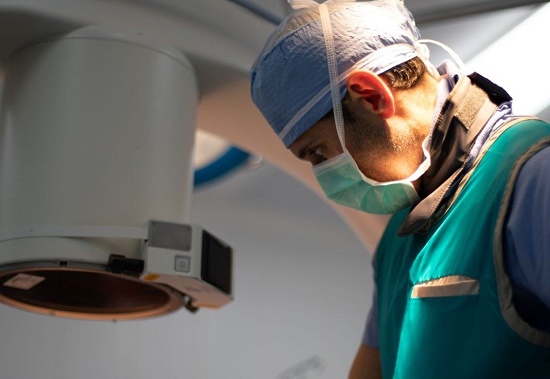Spine Pain and Surgery

When deciding where to have spine surgery, you want to find a location close to home with an experienced team that uses the latest innovations in surgical care.
At UM Shore Medical Group, our neurosurgery team offers an individualized approach to evaluate and treat your spinal condition.
To learn more about our program or to make an appointment at our office in Easton, call 410-820-9117.
Minimally Invasive Spine Surgery
Minimally invasive surgery (MIS) procedures can be used to treat many types of spinal conditions, including degenerative or herniated disc disorders, spinal stenosis and stabilization of the spine.
MIS reduces patient recovery time, with many patients returning to full activity within days to just a few weeks.
- Learn more about minimally invasive spine surgery.
Conditions We Treat
Compression Fractures
Severe back pain could be a sign of a compression fracture, which is when a spine bone collapses. It is often treated with pain medication. If patients don't respond to medication alone, we may suggest kyphoplasty, an outpatient procedure where "cement" is placed within the vertebra to reduce pain, similar to filling a tooth.
Chronic Pain and Post-Laminectomy Syndrome
Chronic pain can be the result of a spinal condition or an injury, or it may occur after back surgery (post-laminectomy syndrome).
A spinal cord stimulator may be placed to help with severe chronic post-surgical back pain and also for lower extremity pain. This type of lower extremity pain may be the result of nerve root scarring, reflex sympathetic dystrophy or other causes.
A spinal cord stimulator trial is performed to confirm significant pain relief can be achieved with stimulation. Once pain relief is confirmed, a permanent programmable paddle of electrodes and battery are placed. The patient then is followed by the device company for programming needs to achieve optimal pain relief.
Degenerative Disc Disease
When the discs that sit between each section of your spine (vertebrae) diminish over time, this is degenerative disc disease. The discs are a jelly-like substance and prevent bone from rubbing on bone. As we age, those discs become smaller, allowing vertebrae to rub together or compress the nerves in a way which causes pain. If surgery is indicated, we will offer a minimally invasive surgical approach.
Herniated Disc
A herniated disc occurs when the disc between spine sections moves out of place. This is also known as a slipped disc or a ruptured disc. It can occur anywhere in the spine and can cause pain, weakness or numbness to your arms or legs. If surgery is indicated, we will offer a minimally invasive surgical approach.
Spinal Stenosis
Spinal stenosis is the narrowing of the spine over time. The narrowing can cause a compression on the spinal cord or nerves, creating pain. If surgery is indicated, we will offer a minimally invasive surgical approach.
Spinal Tumors
Spinal tumors may be cancerous or non-cancerous. Our team of professionals review every case on an individual basis and will base treatment options on your unique symptoms and diagnosis.
For example, cancerous spinal tumors can be treated with radiation or chemotherapy with or without surgical resection and stabilization. Surgery may be recommended to relieve pain and stabilize the spine to improve your quality of life.
Make an Appointment
To make an appointment with our spine neurosurgery team, call 410-820-9117.

